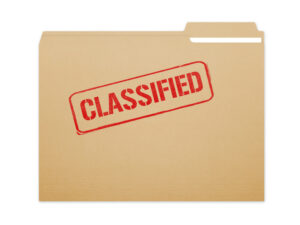Handling Classified Information: Best Practices and Potential Consequences of Mishandling
The mishandling of classified information seems to be constantly in the news these days. If you have a security clearance, however, it is important to remember that mishandling classified information can carry severe consequences. If you are facing issues with your clearance due to the handling of classified information, a federal security clearance lawyer can provide you with guidance.
What Happens if You Mishandle Classified Information?
Government regulations state that deliberate or negligent failure to protect classified information raises questions concerning an individual’s judgment, reliability, and trustworthiness and constitutes a serious security concern. It is important to emphasize that the disclosure can be negligent in order to trigger a potential clearance issue. As a result, even an unintentional disclosure could be problematic.
Of course, intentional disclosure for personal gain is the most serious scenario and will likely trigger federal criminal charges. Inadvertent disclosures or disclosures based on the erroneous belief that the information was not classified could lead to a revocation or denial of your security clearance.
That said, the good news is that mishandling classified information only rarely results in a security clearance revocation or denial. Intentional disclosures or repeated or layered negligent disclosures will receive much more scrutiny than an isolated mistake. That said, it is important to understand what you can do to protect yourself and what consequences you face if you have been accused of mishandling classified information.
Best Practices for Handling Classified Documents
The handling of classified documents is subject to myriad, high-technical regulations and agency-specific policies. As a result, you should refer to your agency’s procedures concerning how classified information should be handled before doing anything else. These procedures will likely be very specific as to steps that should be taken when handling classified information. Furthermore, any deviations from those procedures could be grounds for disciplinary action or termination. That said, here are some basic guidelines for best practices that should be universally applicable:
- Take your responsibilities seriously. As an agency employee with a security clearance, you are expected to both know and comply with any applicable regulations. As a result, you should make sure to pay close attention to all agency guidance concerning how to handle classified information.
- Consult with your supervisor if you have any questions. You should have been briefed as to your agency’s protocols for handling sensitive information. If you were not briefed for some reason or the briefing did not address a particular situation you are facing, you should seek immediate guidance from your supervisor.
- Keep classified documents in the property security container at all times. If you are the custodian of classified documents, you need to make sure that all classified documents are kept in their approved containers at all times. You should especially make sure that all classified documents are secured when you are leaving the office.
- Deal with unsecured documents. Do not leave unsecured classified documents unattended. Secure the document and then inform the appropriate authority.
- Be especially careful when transmitting classified information. Whether you are using phone, fax, email, or some other medium, classified information should only be disseminated via secure devices or networks. Many data security professionals will tell you that breaches are far more likely to occur due to human error – so be mindful that others cannot overhear your conversation or that only authorized persons can receive the information you are transmitting.
- Best practices include the destruction of classified documents. Classified documents are never just thrown away. Even shredding can be problematic if the remains are not properly handled. Be sure to follow your agency’s guidelines for the destruction of classified documents.
If you do happen to mishandle classified information the best thing to do is to inform your security officer as soon as possible and take responsibility for your mistake. Attempting to conceal the mistake or refusing to take action to assess and mitigate the consequences of the disclosure will make the situation far worse. That said, we know it can be difficult to take action in these situations – contact a security clearance lawyer if you need help.
Speak to a Federal Security Clearance Lawyer at the Law Firm of J.W. Stafford Today
At the Law Firm of J.W. Stafford, we are committed to helping federal employees overcome the challenges they face in obtaining and keeping their security clearances. Whether you just need some advice or you need representation in an appeal, we can help you protect your career. To discuss your case and how we can help, call us today at 410-514-6099 or contact us online to schedule an appointment.

